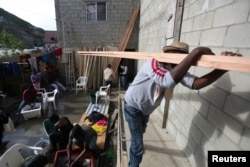Pierre Lumps Benoit wasn’t planning to end his northward trek from Brazil here in the border town of Mexicali last November. The young Haitian man had set his sights on a music career in the United States, but U.S. immigration officials at the southern border deemed otherwise.
So, Benoit shifted his focus. He found a place where he and his wife could live and a job managing the Jaguar nightclub. Better known as a musician named Woldo, he anticipates having a signing party there "soon," when he releases his first CD. It’s called "My Dream."
It’s "not easy to live in this country. The salary is very low," the 31-year-old said, conceding it’s still better than in Haiti. Here, "the officials welcome you like human beings, not like refugees."
He’s among thousands of Haitian migrants who, beginning in early 2016, set off for the United States. But, dissuaded by tightened U.S. immigration policy, some like Woldo have been stranded south of its border. They’ve modified their own dreams and are putting down at least tentative roots in Mexican soil.
More adjustments
They’ve been uprooted before. After a massive 2010 earthquake in Haiti killed at least 230,000 people and decimated the economy, roughly 50,000 left to seek work in Brazil. Some found it, including on preparations for the 2016 Summer Olympics. But when the South American country’s recession deepened, jobs dried up. Many of those Haitian migrants began heading for the United States that spring, hoping to enter under a humanitarian program, Temporary Protected Status, offered after the quake.
To deter the migrants, U.S. Homeland Security in September 2016 ended its six-year freeze on non-criminal deportations. It only briefly let up on those removals after Hurricane Matthew ravaged Haiti last October, killing at least 500 and scouring the southwest region of housing, jobs and crops.
Meanwhile, the number of Haitian migrants turned away by the U.S. Customs and Border Protection’s field office in San Diego, California, surged – from 333 in fiscal year 2015 to 6,377 the next year and 8,045 most recently.
Rodulfo Figueroa Pacheco, who oversees the Mexican government’s National Migration Institute office in Baja California, said the Haitian population in his state peaked at between 5,500 and 6,000 while they awaited U.S. immigration decisions on their individual cases. Now it has declined to "a little under 3,000," he said.
For a time, Haitians and many other migrants overwhelmed shelters in Mexicali and Tijuana.
"In the case of the Haitians, the community responded," said Hugo Castro, a coordinator for SOS Migrants and a board member of the aid group Border Angels. "Many aided the emergency shelters."
Differing perspectives
Some of the Haitian migrants look upon their stay in Mexico as a dream deferred.
That includes Richelet Marvouvil, an economist working in Tijuana at a car wash called Glamour Autolavado, where he earns 600 pesos a week plus tips. He arrived at the border town in February after a month of travel from Brazil – via plane, boat, car and his feet.
"I have a dream of going to the United States," Marvouvil said. "Labor is valued there more than in other countries in the Americas."
But a young woman who gave her name only as Dieunese said she was content to build a new life in Baja California with her Haitian husband. They gave up on Brazil after 18 months and now have been in Mexico – first in Mexicali, then in Tijuana – for almost a year. She found work at a Tijuana restaurant specializing in hot dogs.
"Mexico is good," she said. "Even people who do not have papers can get work and have jobs."
Seeking legal status
Many of the Haitian migrants arrived without papers, identifying themselves as Congolese to decrease the risk of deportation, according to the Mexican government as well as the Migration Policy Institute, a U.S. research organization. Since the Refugee Act of 1980, the United States has accepted thousands of people fleeing violent conflict in the Democratic Republic of the Congo. In fiscal 2016, it admitted 16,370 DRC refugees, "the highest number from any nation," the Pew Research Center reported.
To help its nationals obtain legal documents, the Haitian Embassy in Mexico City opened offices this summer in both Mexicali and Tijuana. "Their dream to go to America is very challenging," Guy Lamothe, Haiti’s ambassador to Mexico, told VOA. "Those papers will open new opportunities for them."
Mexico’s government also set up special processing centers with extra staff to process the Haitians, though it scaled those back as of Sept. 30. By then, roughly 2,700 Haitians had been granted temporary visas based on humanitarian grounds. Good for one year, the visas can be renewed at the government’s discretion.
Future applications will be considered "case by case," said Figueroa, the Baja California immigration official. He said of the migrants, "We’re eager for them to have status and be able to work and be productive."
Home sweet home
Woldo, the musician, says he’s grateful to Mexico’s government and people. Of course, he still thinks about his homeland.
"My goal is to make money and return to Haiti, home sweet home. Anywhere I go – and on radio or TV or in my shows – I always raise my Haitian flag."
Jacquelin Belizaire reports for VOA Creole. Arturo Martinez reports for VOA Spanish. Carol Guensburg also contributed to this story.














